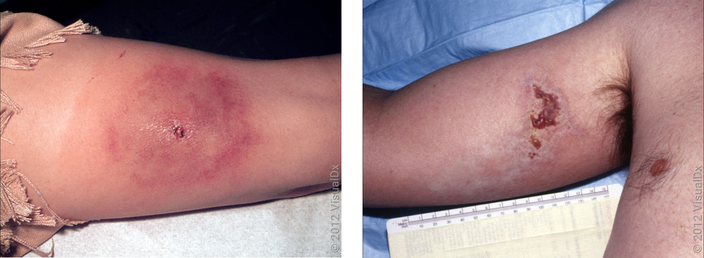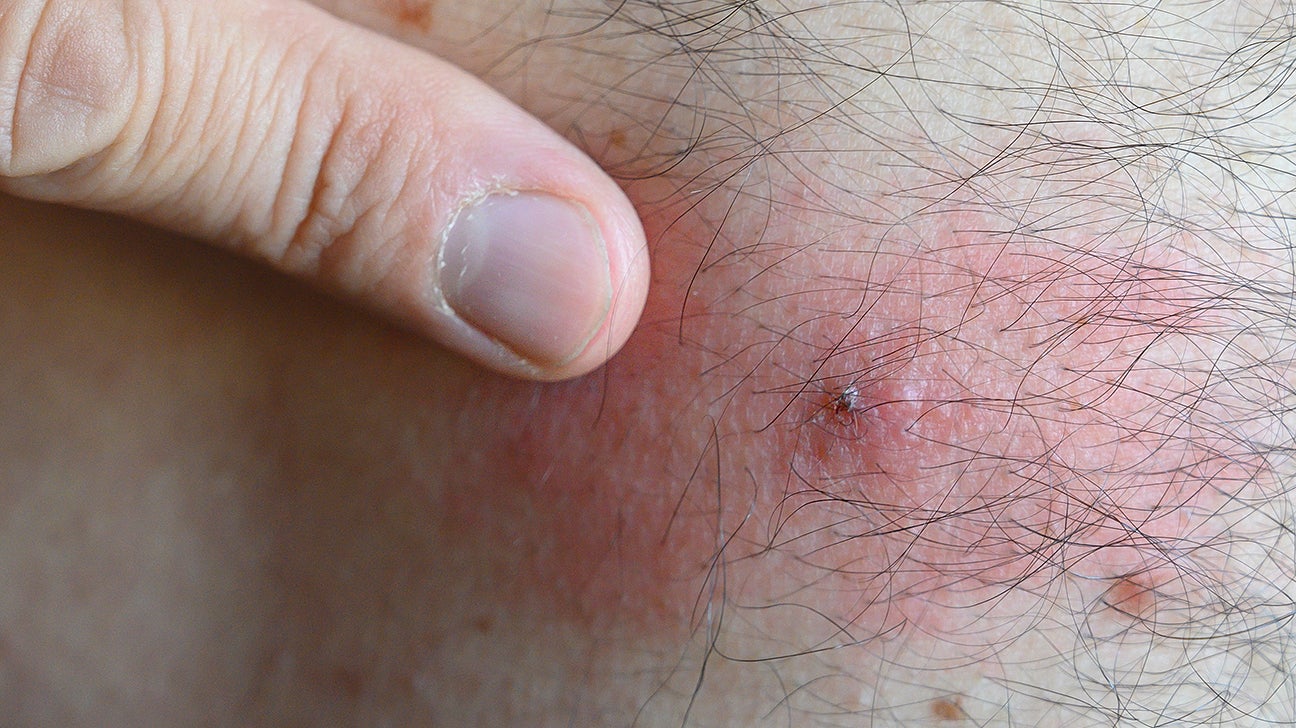If a spider bite gets infected, clean the area thoroughly and apply antibiotic ointment. Seek medical attention promptly if symptoms worsen.
Spider bites can sometimes lead to infections, causing redness, swelling, and pain in the affected area. It’s essential to know what steps to take if you suspect an infection from a spider bite. By following proper care guidelines and seeking medical help when needed, you can effectively manage an infected spider bite.
We will discuss the necessary actions to take if you believe a spider bite has become infected, including cleaning the wound, applying antibiotic ointment, and knowing when to seek professional medical assistance. Let’s explore how to handle an infected spider bite and ensure a quick and safe recovery.
:max_bytes(150000):strip_icc()/spiderbitefinal-5a2ff7229e94270037bb4efa.png)
Credit: www.verywellhealth.com
Identifying A Spider Bite
Common Symptoms
Common symptoms of a spider bite include redness, swelling, pain, and itching at the site of the bite. Some bites may also develop into open sores or ulcers.
Types Of Spiders To Watch Out For
Types of spiders to watch out for include the brown recluse and black widow. The brown recluse bite may cause a red or purple blister at the bite site, while the black widow bite may lead to severe pain and muscle cramps.
When To Seek Medical Attention
If a spider bite becomes infected, seek medical attention immediately to prevent further complications. Look for signs of infection such as increasing pain, redness, or swelling around the bite area. It’s important to get prompt treatment to avoid any potential risks to your health.
When to Seek Medical AttentionSpider bites can be painful and uncomfortable, but usually, they can be treated at home. However, if you notice any signs of infection or severe reactions, it’s essential to seek medical attention as soon as possible. Here are some signs that indicate when you should seek medical help:Signs Of Infection
If you notice any of the following signs, it’s crucial to seek medical attention immediately:- Redness and swelling around the bite that extends beyond a few centimeters
- Pus or discharge from the bite
- Fever or chills
- Increase in pain or tenderness around the bite
- Red streaks spreading from the bite
Severe Reactions
In rare cases, spider bites can cause severe reactions that can be life-threatening. Seek medical attention immediately if you experience any of the following:- Difficulty breathing or swallowing
- Nausea or vomiting
- Severe pain or cramping
- Uncontrollable muscle spasms
- Fainting or dizziness
First Aid For Spider Bites
Immediate Steps
Wash the bite area with soap and water.
Apply a cool compress to reduce swelling.
Elevate the affected limb to prevent further spread.
What To Avoid
- Avoid scratching the bite area.
- Avoid applying heat to the bite.
- Avoid consuming alcohol or caffeine.
Home Remedies For Relief
Natural Treatments
To help alleviate infection from a spider bite, consider using natural treatments such as:
- Applying aloe vera gel to the affected area
- Using tea tree oil as an antiseptic
- Applying raw honey for its antimicrobial properties
Pain And Swelling Reduction
If you’re looking to reduce pain and swelling from an infected spider bite, try these remedies:
- Elevate the affected area to reduce swelling
- Apply a cold compress to numb pain
- Take over-the-counter pain relievers like acetaminophen
Medical Treatment Options
Spider bites can sometimes get infected, requiring medical treatment options. If you notice signs of infection, such as redness, swelling, or pus, it’s important to seek medical attention promptly. Treatment may include antibiotics, wound cleaning, and pain management to prevent further complications.
When a spider bite becomes infected, seeking prompt medical treatment is crucial to prevent further complications. In some cases, self-care measures may not be enough, and professional intervention is necessary. Here are the medical treatment options available for an infected spider bite:Antibiotics
Antibiotics are commonly prescribed to treat infections caused by spider bites. These medications help fight the bacteria responsible for the infection, reducing inflammation and promoting healing. The specific antibiotic prescribed will depend on the severity of the infection and the type of bacteria present. It’s important to complete the full course of antibiotics as prescribed by the healthcare provider to ensure effective treatment.When Surgery Is Needed
surgery may be necessary. This procedure involves draining the abscess to remove pus and infected material. Surgery may also be required to remove dead tissue or to repair any damage caused by the infection. The decision to perform surgery will depend on the assessment of the healthcare provider and the individual circumstances of the infected spider bite.In addition to these medical treatment options, it is essential to keep the affected area clean and dry, and to follow any instructions provided by the healthcare professional. Prompt medical attention is crucial to prevent further complications and ensure a speedy recovery from an infected spider bite.Preventing Infections
Preventing infections is crucial when dealing with a spider bite. By taking the right precautions and maintaining proper wound care, you can minimize the risk of infection and promote faster healing. Here’s how you can prevent infections and ensure the bite heals properly:
Wound Care Basics
Proper wound care is essential in preventing infections. Keep the bite clean and follow these basic steps to aid in the healing process:
- Wash your hands thoroughly before touching the affected area.
- Clean the wound with mild soap and water to remove any debris or bacteria.
- Gently pat the area dry with a clean towel or gauze.
- Apply an over-the-counter antibiotic ointment to the bite to prevent infection.
- Cover the wound with a sterile bandage to protect it from further contamination.
Keeping The Bite Clean
Keeping the bite clean is crucial for preventing infections. Here are some essential steps to ensure the bite remains clean and free from contaminants:
- Avoid scratching or picking at the bite, as this can introduce bacteria and increase the risk of infection.
- Change the bandage regularly, especially if it becomes wet or dirty.
- Avoid submerging the bite in water, as it can soften the skin and make it more susceptible to infection.
- Monitor the bite for any signs of infection, such as increased redness, swelling, or drainage, and seek medical attention if necessary.
Monitoring The Bite
If a spider bite becomes infected, it’s crucial to seek medical attention immediately to prevent complications. Monitoring the bite for any signs of infection, such as redness, swelling, or pus, can help in timely treatment and recovery.
If you’ve been bitten by a spider, it’s essential to monitor the bite carefully. One of the first things you should do is clean the wound with soap and water. After that, keep an eye on the bite for any signs of infection.Tracking Symptoms
If you notice any of the following symptoms, it’s a sign that the bite may have become infected:- Redness and swelling around the bite area
- Pain or tenderness at the bite site
- Fever
- Chills
- Nausea or vomiting
- Difficulty breathing
Knowing When to Call a Doctor
If you notice any of the above symptoms, it’s essential to call your doctor immediately. Depending on the severity of the infection, your doctor may prescribe antibiotics or suggest other forms of treatment.It’s also important to note that some spiders, such as black widows or brown recluses, can cause severe symptoms, and medical attention should be sought immediately.In conclusion, monitoring a spider bite is crucial to avoid any complications. Tracking symptoms and knowing when to call a doctor can help you stay on top of any potential infections and ensure that you receive prompt treatment if needed.
Credit: www.healthline.com
Prevention Tips For The Future
If a spider bite becomes infected, clean the area with soap and water. Apply a warm compress to reduce swelling and pain. Seek medical attention if symptoms worsen or if you develop a fever. Follow these prevention tips for future incidents.
Avoiding Spider Habitats
Prevention is always better than cure. To avoid spider bites, it is necessary to avoid the spider habitats. Spiders can be found in dark and damp places, such as basements, attics, and crawl spaces. Be cautious when cleaning these areas, and wear protective clothing such as gloves and long sleeves. Keep your home clean and free of clutter, as it can provide a breeding ground for spiders. Use a vacuum cleaner to remove spider webs, and seal any cracks or gaps in your home to prevent spiders from entering.Protective Measures At Home
To protect yourself from spider bites, it is essential to take preventive measures at home. Use insect repellents, especially during the spider season. Keep your windows and doors closed, and use screens to prevent spiders from entering your home. If you live in an area with a high spider population, consider installing a spider-proof screen on your windows and doors. Wear protective clothing, such as long pants and sleeves, when working outside.If you notice any spider bites, clean the wound with soap and water, and apply an antiseptic cream. If the bite becomes infected, seek medical attention immediately. Remember, prevention is always better than cure, so take the necessary precautions to protect yourself and your family from spider bites.
Credit: www.goodrx.com
Frequently Asked Questions
What Are The Signs Of An Infected Spider Bite?
Signs of an infected spider bite include redness, swelling, pain, warmth, and pus. If you notice these symptoms, seek medical attention promptly.
How Can I Treat An Infected Spider Bite At Home?
To treat an infected spider bite at home, clean the area with soap and water, apply an antibiotic ointment, and cover it with a bandage. If the symptoms worsen, consult a healthcare professional.
When Should I Seek Medical Help For A Spider Bite?
Seek medical help for a spider bite if you experience severe pain, muscle cramps, fever, or the symptoms worsen after a few days. It’s essential to get professional care for proper treatment.
Conclusion
Taking immediate action is crucial if a spider bite becomes infected. By following proper wound care techniques, such as cleaning the area, applying antibiotic ointment, and keeping it covered, you can help prevent further complications. It is also important to monitor the symptoms closely and seek medical attention if necessary.
Remember, early detection and treatment are key to managing an infected spider bite effectively. Stay informed, stay safe!
Related posts:

I’m MD Tanvir, and I bring years of expertise gained from working closely with pest control companies to the forefront. My journey in the industry has inspired me to launch Bug Battler, a platform aimed at equipping people with the know-how to combat pests autonomously. Through Bug Battler, I aim to empower individuals with practical insights to tackle pest infestations effectively.

